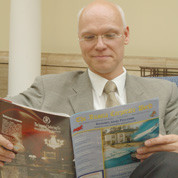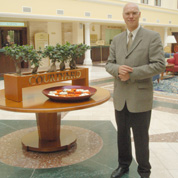Tapping on Courtyard’s unique features to trump competition

How did you choose your current profession?
I asked my parents this question not so long ago. They told me that on one of our winter vacations in Portugal when I was a small boy, hotel guests were invited to a cocktail welcome reception. There, I saw a smartly dressed gentleman who was shaking hands with all the guests, welcoming everyone and exchanging pleasantries. I gave my mum a nudge and said, “Look, I want to be like him, mom.” Little did I know what I let myself into. However, I have been in hospitality for the past 24 years now and never regretted that decision.
Before coming here, did you have prior knowledge of the country, its culture, etc?
I had what most people have about Russia, mostly misconceptions. Despite the fact that I consider myself  an open-minded person, news and media, etc, form one’s picture of certain parts of the world. When I first came to Moscow in 2004, I was quite surprised seeing such a vibrant and cosmopolitan city, a far cry from my biased ideas. A dynamic environment is always a hotelier’s preference and now after three years, I can only say that reality has substantiated the good experience.
an open-minded person, news and media, etc, form one’s picture of certain parts of the world. When I first came to Moscow in 2004, I was quite surprised seeing such a vibrant and cosmopolitan city, a far cry from my biased ideas. A dynamic environment is always a hotelier’s preference and now after three years, I can only say that reality has substantiated the good experience.
Taking a decision to pick up a job in a location without prior deep knowledge seems adventurous. Would you say you like risks?
Well, you could say so, especially if you take into consideration the fact that prior to Moscow, I had been in Beirut, Lebanon, and Jeddah, Saudi Arabia – destinations that are most probably not on the Top-10 hit list of where one would like to go, compared to most people’s default favorite options of Paris, London or Rome. But places like Moscow offer unique opportunities to develop oneself and business. I have never regretted any of the decisions made in terms of professional job destinations, and Moscow is no exception in that respect. Surely a certain spirit of adventurism has to be in you in order to enjoy it.
How would you characterize today’s Russian – and Moscow – hotel markets?
You rightly demarcate these two because Moscow and Russia are two different worlds in terms of our business. Moscow is a very powerful micromarket because of its huge concentration of the country’s business and political powers. So, there is no second Moscow. The only city remotely coming close to it would be St. Petersburg, but it is a lot more exposed to seasonal business. Moscow is busy all year-round. I can describe the Moscow market as vibrant, dynamic and demanding, at times a little erratic.
 “With regards to the rising competition, let me say that the Courtyard is only 18 months old now, and within this period, it has been able to build a solid foundation of preference. One major factor responsible for this achievement, of course, is its favorable location.”
“With regards to the rising competition, let me say that the Courtyard is only 18 months old now, and within this period, it has been able to build a solid foundation of preference. One major factor responsible for this achievement, of course, is its favorable location.”
What about the whole country?
With respect to the rest of the country, as I have already noted, St. Petersburg has much stronger tourism influence, which, of course, is very seasonal, and the city becomes quiet during the rainy and winter seasons. There are several other locations in the country, which have lots of business potential, such as Yekaterinburg, Novosibirsk, Tomsk, Omsk, and others such as Rostov-on-Don and Sochi, which are leisure driven. These locations have their own different micro drivers for the business, with various positive indicators of future growth potential. However, this cannot be seen as one Russian market driver – a factor that has to do with the vastness of this country. Take, for instance, Samara, where the last Russia-EU Summit took place. This event has helped to highlight the enormous business opportunities of this particular region.
What is your opinion on the high concentration of Marriott-branded properties almost in one location in Moscow?
First of all, every brand that comes under Marriott worldwide is a member of the Marriott family, so generally speaking “concentration” is a good thing. In Moscow, there are currently six Marriott portfolio properties. They do not have common budgets or financial goals as management and ownership setups differ. However, I would like to say that I’m very thankful for the first three Marriott hotels having been here for the past 10 years because they paved the way for Courtyard to come into the market with a well-known name. The market conditions might be favorable at present, but at the same time, you are judged by your performance vis-a-vis your competitors, and in this regard, Marriott has all rights to claim its very strong influence on the Moscow market. In conclusion, I would like to say the positive synergies in having multiple Marriott brands in one location far outweighs any disadvantage that this could possibly pose.
Drawing on your global exposure, what would you say is unique about doing business in Russia?
I can only speak about the hospitality industry, as I’m not in a position to professionally comment on the investment climate. The modern Russian hospitality industry is relatively young, having started only in 1989 or 1990. For me, doing business has been comparatively straightforward. On one-to-one dealings, I have found Russians to be conscientious and very open-minded partners. With regards to bureaucracy, as everyone knows, it can be rather challenging. I come from a city, where in the old days, deals were conducted with just a handshake. Such agreements were considered binding under all circumstances. Here, every little step is accompanied by huge paperwork, which needs hundreds of reviews and notarizations by different authorities. This, of course, makes it more challenging to stick to all the rules. I have to note, however, that Marriott is known all over the world for conducting business in an ethical way, and Moscow is no exception. Therefore, we will not get involved in any business deals that would compromise Marriott’s standards. To be fair however, I also need to say that I have never been asked to do so either.
The rising competition has been compounded by the arrival of Ritz Carton and other new developments. What is Courtyard doing to remain competitive?
Let me first of all welcome the Ritz Carton on board for two very solid reasons. One – it is a part of the Marriott family, our top-of-the-range luxury brand. Secondly, even if it was not a Marriott property, I would still welcome its arrival because the market still needs this class of hotels, which are capable of pulling in top-end clientele. With regards to the rising competition, let me say that the Courtyard is only 18 months old now, and within this period, it has been able to build a solid foundation of preference. One major factor for this, of course, is the favorable location, which is very convenient for business and leisure travelers alike, with the Kremlin, Bolshoi Theater, Tchaikovsky Conservatory, Pushkin Museum – all within a walking distance. This is an invaluable asset, especially in a city suffering from traffic jams. Secondly, we will make all efforts to keep the property and its services cutting edge. The hotel has to have a “crisp’ feel and services need to be relevant to our clientele. This year, we are adding a lobby bar and a street entrance for one of the restaurants as well as sun protection in one of the atriums. These are relevant and needed upgrades to satisfy our customers beyond their expectations, which will translate into more repeat business.
What are your favorable pastime hobbies?
I am working a lot and really enjoy what I’m doing, so sometimes, I forget that there is life out there. When there is time, I’m an avid traveler; I’m not just referring to long-distance travel, but equally within the city and the country. Sometimes, the small pleasure of driving into one of the small towns around Moscow to see an interesting assembly of churches, take pictures and have a picnic can already be a good break. I also play tennis when time permits. Besides, my three-year-old son also kind of dictates how I spend my spare time, because I need to factor his wishes into our plans. Sometimes, we take him to a yacht club in northern Moscow for swimming and boating. In terms of arts and culture, my wife is the one with good knowledge of the artistic circle of Moscow, with me accompanying her on her regular visits to the galleries and exhibitions. Theatre? As my Russian is still poor, at the Bolshoi, it can be only ballet.












 Web design,
Web design,